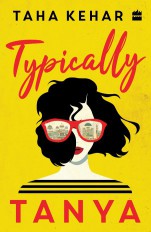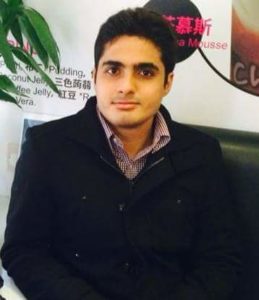‘Bollywood has helped build a bridge between India and Pakistan’

Saurabh Tankha
Around four years back, Karachi-based journalist Taha Kehar gave up the prospect of a legal career and flew back to Karachi from London where he was pursuing a law degree from SOAS, University of London. He became a full-time journalist/ editor at The Express Tribune where he worked on the Peshawar city edition and the bimonthly books page. Kehar now works at the opinions section of another newspaper in Karachi and contributes to both Indian and Pakistani magazines, newspapers and publications. Typically Tanya (Harper Collins Paperback 252 pages Rs 299) is Taha’s debut fiction after penning his debut novel, Of Rift and Rivalry, in 2015.
L&M had a chat with the Pakistani author…
When and how did the idea of penning Typically Tanya hit your mind and how much time did it take to put the thoughts on paper?
The protagonist of Typically Tanya streamed into my mind before I’d even thought about writing the novel. She had one complaint: She didn’t trust the Careem drivers who took her from point A to point B in Karachi. With that one confession, Tanya Shaukat morphed from an idea that was stashed away in my mind to a real person with views, quirks and priorities. I wrote the first draft between September 2016 (when the book begins) and July 2017 (when the book ends). I revised it considerably over the next few months through the insights and suggestions of my agent, Kanishka Gupta, and my commissioning editor Swati Daftuar. But it was during those initial nine months that the novel took its first breath and walked its first few steps.
Your debut novel, Of Rift and Rivalry, was about a family’s struggle to survive the onslaught of history while Typically Tanya is about a headstrong woman. How different is the Pakistan from the days of Partition to now?
I was born in the early 1990s and can only rely on historical accounts to draw parallels between Pakistan of yore and the country that has been my home for over two decades. Even Of Rift and Rivalry took a tangential glance at the events of Partition, treating them as flashbacks in a story that moved ahead despite all the unresolved conflicts from the past.
I suppose the history of Partition and the events that have characterised Pakistan’s 72-year-long journey continue to exert an influence in strong yet subtle ways. The protagonist of Typically Tanya also belongs to this world and her political opinions indicate that the forces of history continue to loom large in all spheres.
Also, ‘headstrong’ is a strong word to use for Tanya. I think she is self-aware and unwilling to compromise on her beliefs – especially for those who will trample over them.
As you have written for both Pakistani and Indian publications, how do you find the approach of the media on various subjects in the two nations? Are they any different?
There’s obviously a difference in the narrative. But the overall approach remains somewhat similar.
How culturally similar are the people of India and Pakistan?
The subcontinent is a potpourri of diverse legacies that once coexisted. It is difficult to erase this fact. Some believe that the differences between India and Pakistan are restricted to the cricket pitch since Bollywood has helped build a bridge between both nations. While this may be an optimistic view, it doesn’t negate that the fact that the people of Pakistan and India are culturally similar.
Which city in India do you find closest to Karachi?
If I were to make a simplistic comparison, Mumbai’s proximity to the ocean might present some familiar sights and sounds. Like Mumbai, Karachi draws people from across the country. But it isn’t the centre of Pakistan’s film industry, even though it is the country’s largest and most cosmopolitan city. From what I have gleaned through news reports over the years, the political landscape of Delhi is also quite similar to that of Karachi.
The first time you felt the urge to express yourself through writing…
At age six, I stapled together four sheets of paper and decided to write a book about ‘the earth’. To my child’s mind, it was no different from a football painted blue and green. But I knew I wanted to tell its story.
Who has been the most inspirational person in your life and why?
My great aunt, who lived for almost nine decades, tacitly taught me that life doesn’t stop at the first wink of a calamity.
What/ who has influenced you and what were the motivations behind writing?
I was ‘fed’ the classics as a child by an overzealous mother who thought my life would be quite bereft without a healthy dose of ‘Wuthering Heights’ and ‘Great Expectations’. While these books did fuel my imagination and taught me the lesson of empathy, I struggled to understand the setting and overly Anglophone characters. During my teens, I discovered that I had a soft corner for South Asian fiction, even though some authors from the Subcontinent pandered to the West. But I always felt there were some stories that still needed to be told. Years later, I decided to become a writer and tell them.
These days the market is deluged with authors of all ages. How easy or difficult is it to achieve success amid so much competition?
It’s difficult to not be competitive. But success is a matter of kismet. The market is saturated with writers who eventually go on to become authors. But the world always needs new storytellers. Instead of fixating on who the bigger author is and who has climbed his/her way up a noted bestseller list, our focus should be on how many people our stories inspired.
Ever struggled with a writer’s block?
I have. It wasn’t easy to stare at a blank Word document on my laptop screen. But I slowly convinced myself that words and ideas need time to gestate. So, I decided to live a little and wait until the words came to me.
Plans for future…
Since January, I’ve been obsessed with the idea of somehow weaving Marlon Brando’s movies (other than The Godfather) into a novel based in South Asia. Fortunately, not all ideas are expected to be brilliant. For some months now, I’ve been tempted to revisit Tanya’s world and see if she’s up for doing a sequel.


